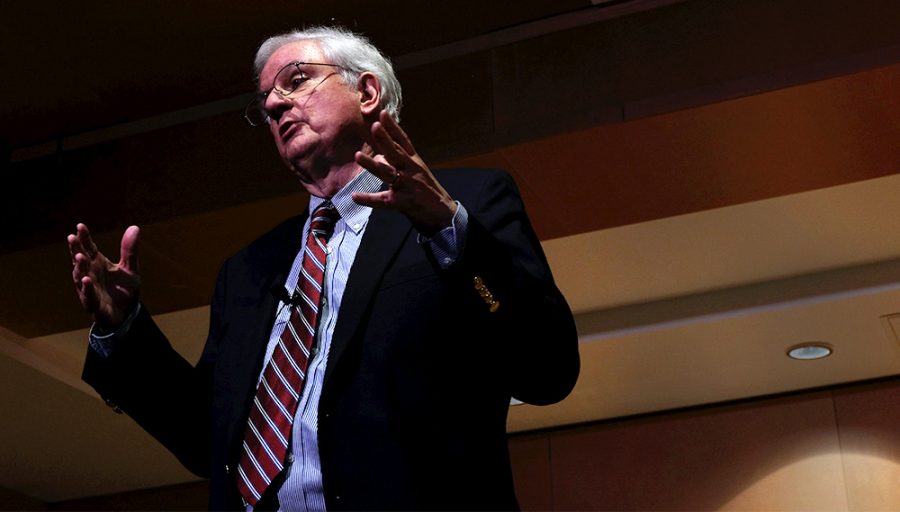Lecturer discusses how Civil War issues live on
Gaines M. Foster, a professor of history at Louisiana State University, gives a lecture on Civil War memory at the 13th annual Barry D. Riccio Lecture Monday night in the Doudna Fine Arts Center.
February 19, 2019
Gaines Foster, Louisiana State University professor, said economic and cultural divisions factor into support or opposition for confederate symbols instead of regional ones, forming the essence of his “Still Fighting the Civil War?” lecture at the Doudna lecture hall on Monday.
Kicking off the first annual Presidential lecture, and coinciding with African American Heritage Month, he noted contemporary fights in the aftermath of the surrender at Appomattox Court House, including the confederate statues and flag.
Foster underscored how those that consider geography, not racial bias, as the underlying stimulus behind these divisions, are diverting the conversation away from themselves.
“The problems of race in American society, which is what this fight on one level is all about, is not purely a southern phenomenon,” Foster said. “It lets northerners off the hook.”
Simply removing the flags and monuments, Foster said, may encourage onlookers to believe that the issue of racism has been unequivocally exterminated.
He maintained how dealing with racism and white supremacy is a central dilemma in American society today, one requiring swift condemnation of those who espouse bigotry.
“I think, as a historian, more than thinking about the Civil War, you have got to understand the legacy of slavery, you have got to understand the legacy of segregation, you have got to understand the legacy of what amounts now to a four-decade-long retreat from the advances of the Civil Rights movement of the 1950s and 1960s,” Foster said.
Less than a month after white supremacist Dylan Roof murdered nine African Americans at the Emanuel African Methodist Episcopal Church, South Carolina lawmakers ratified a bill that arranged for the removal of the confederate flag from the state capital.
But rather than taking it down on the basis of its racist symbolism, then-governor Nikki Haley, troubled by its potential effect on tourism, felt emboldened by an entirely different motive.
Upon the release of a picture in which Roof could be seen holding a Confederate flag, many were quick to remark that he was a warrior of a lost cause, viewing it as a 21st century manifestation of the Civil War.
“What worries me is that sense of grievance,” Foster said.
“The support for confederate symbols comes from the grievance, not the support of the symbols causes the grievance.”
Contrary to public perception, northerners tend to deem the Civil War more important while possessing a deeper understanding, Gaines said, than southerners, according to public opinion polls.
There has been an aversion, amongst northerners and southerners alike, to discussions about the causes of the Civil War, referencing the battlefields, Abraham Lincoln and Robert E. Lee.
Since the Civil rights movement, this unified memory of the Civil War was particularly difficult to hold up because, as Civil Rights leaders made clarion calls for equality, African-Americans never accepted that interpretation.
“It has all become more complicated because the emancipationists view, the way African Americans are forcing us to think about the Civil War, is a much more powerful force than it’s ever been before,” Gaines said.
Tom O’Connor can be reached at 581-2812 or at [email protected].



















































